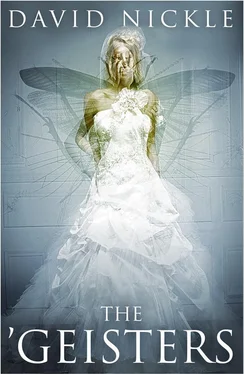As far as Ann knew, Philip didn’t hate anything. Not there, anyway.
Ann would remember the house at the lake for a long time—first, because she watched it being made. Her dad was a structural engineer and when she was little he started his own company. He was good at it and soon he was making buckets of money. The first bucket went to buying the old lot on the lake. The second bucket, to buying a beautiful sailboat to tie up there. The third, to figuring out the best house for them. The money they got from selling that other house went to building it.
It was built of cedar logs, mostly, with some concrete and stone around the foundation and slate for the roof. That summer, the summer they went there, it wasn’t finished yet. The foundation was in and the walls were up, but it was a hollow box: a maze of two-by-fours and plastic sheets, conduits and copper pipes all exposed—open holes where windows would go. So they couldn’t live in it. But the last place there had had a nice dock and a boathouse next to it, and that was where they stayed, while the crew their dad had hired finished the job.
Philip thought the boathouse was worse than the old house. It was small, shaped like a shoebox, and it was damp, and in the night the water from the lake lapped under the floorboards.
“I think it’s nice,” said Ann as they lay on the air mattresses at the far end of the little boathouse from their parents, and Philip said, “It makes me want to pee.”
“So pee,” she said.
“You first.” Philip knew the one thing that Ann didn’t like about this place was the facilities, as her dad called them: an orange outdoor toilet that got emptied weekly and smelled… well, of pee, of course.
“You don’t need to go there,” she said. “You can just go outside.”
“I can go right here,” he said, and Ann rolled over and gave him a kick.
“I would,” he said. “I’d pee all over you.”
“Gross.”
“Yeah. It would be gross,” he said, slowly so as to emphasize each word.
“Quiet time,” said her mom from behind the sheets they’d hung at the far end of the boathouse, for privacy. She was there alone with them that night; their dad, down in the city taking care of a contract with some condo dwellers. Philip pulled his headphones over his ears and changed CDs in the blue Discman he’d brought with him. He rolled over and opened the book he was reading. It was an old spy book by Len Deighton. Yesterday’s Spy . There was a picture of a rusted automatic pistol on it. Ann wanted to read it next.
When he turned the page, Ann got up and tiptoed over to the window. It was an old-fashioned wood-frame with nine panes. The glass rippled like tree gum. Outside, night settled over the lake, but she couldn’t see it, for the reflection of Philip’s reading light.
She squinted, and put her thumb on the lower left pane, and traced the crack there. When they’d arrived, it had only been as long as her middle finger. Now, it was long as her hand, heel to fingertip.
She didn’t care what Philip said: even though it was small, and temporary—and it smelled like lake, and she didn’t yet have her own space—she liked this little boathouse better than the old house. The window was just her size. And as far as the lapping water went: it was nice.
It sounded like home.
They had a beautiful boat.
She was a sailboat, made of rich brown wood—oak, and mahogany—and although even Ann could tell she wasn’t very big, she was big enough, with a long cabin where you could cook a meal and sleep overnight and use the bathroom if you needed to. That was half the reason they were here in the summer before the house was finished—their dad was in love with the boat, which he’d named the Bounty II . The first Bounty being the boat he’d owned for a while when he worked in the Caribbean, back in the day. He was in love with that one, he was in love with this one too—or so Ann’s mom said.
“That’s your true love, Bill, right there in the water. Children, say hello to your new mom.” And everybody laughed.
But even young as she was, Ann thought her father’s feeling toward the boat was more complicated than love, and maybe not as nice either. Her father bought the boat in February from a dealer he’d met when they all went to the Boat Show the month before. Their parents had agreed a small power boat made the most sense. They might use it for errands to the marina across the way, or visiting other cottagers, or fishing, or water-skiing.
When they got there, it was a different story. Ann didn’t notice anything strange about her parents at first—she fell under the spell of the fancy booths and the music, the smell of beer nuts and the pretty women who stood at all those booths, and all those boats. There was a stage show with dancers in the middle. They had scuba divers too, in a big glass tank. You could knock on the glass and the diver would knock back.
But once that magic wore off, Ann started to pick up on things. Her mom was talking constantly—more than usual, in fact. Philip hurried ahead of them, almost too far to shout. Her dad, meanwhile, became very quiet. He stopped for a moment, in the space underneath a parasail that dangled from the ceiling and stared into the fabric until Ann nudged him. When they paused at a dealer’s show space, it was usually at their mom’s suggestion. He jammed his fists into the pockets of his coat and nodded while she asked him what she thought about this, or that, and he hurried them along.
Ann was starting to wonder whether her dad really wanted to buy a boat. He looked like he just wanted to leave.
But after lunch, they stopped at a booth from a North Bay company called Clinker. There weren’t any boats here—just photographs that were wrapped in plastic, of sailboats for the most part, and a stack of three thick binders. The booth was being run by an old woman who wore a white Clinker sweatshirt and a sun visor. Her skin was wrinkled and brown as leather.
Their dad stopped, and looked at the photographs, and said to their mother: “Go look at the jet skis. I’ll catch up.” And as they went off, mom shaking her head, Ann watched as their dad stepped uncertainly up to the booth and introduced himself to the woman there.
The next month, as they sat in the tidied-up kitchen of the old house waiting for an appointment with their realtor, it emerged that he had bought them a boat. The Bounty II . Not, he admitted, exactly what they’d discussed. It had a motor on it, true, but that wasn’t the point of it. The boat was made for sailing. It was made, really, for sailing on bigger water than the lake. Twice, he said, the previous owner had sailed it down the St. Lawrence River and out into the Atlantic Ocean, south as far as the Caribbean Sea. That was where the photograph had been taken—on a bright day in the Caribbean, no land in sight. The water was a deep green, the sky uninterrupted blue. The boat was still, its sails down, mast stretching above the top of the frame. Someone—an old man, with a baseball cap and a white beard—sat in the cockpit, right hand frozen in a cheery wave.
Yes, their father said, in fact it had cost more than they’d planned to spend. “But she’s a beautiful boat,” he said, and their mother looked at the photograph, and then at him, and said nothing.
Were it not for the boat, they would not likely have moved to the new property so quickly. Their dad wanted to sail—wanted to make up for lost time, he said. And he wanted his children to sail also, and he was very keen not to waste the summer. So when school finished in June, they moved most of their possessions into storage, the family into the boathouse, and the Bounty II alongside the dock beside the boathouse.
Читать дальше












